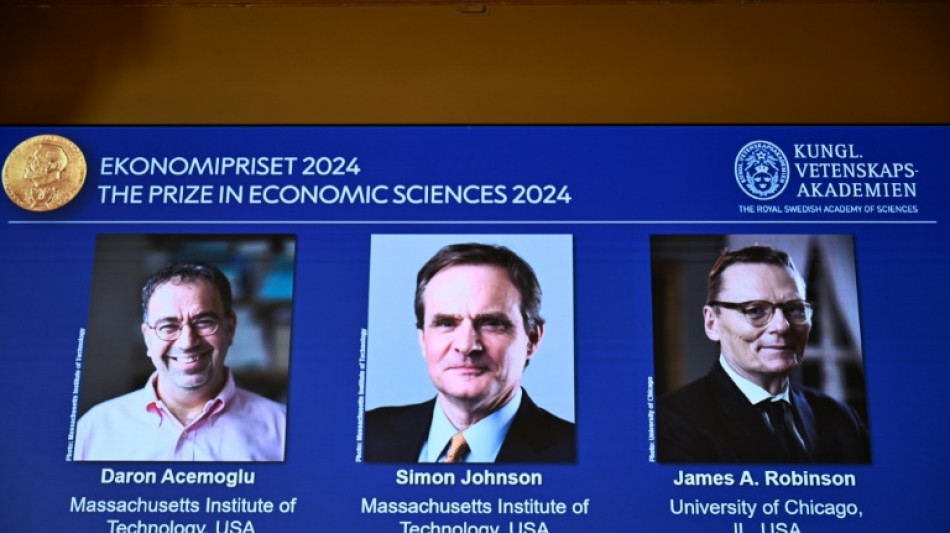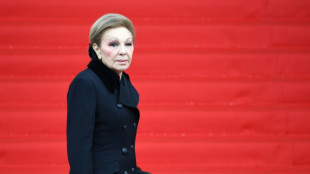
-
 Trump says world 'not secure' until US has Greenland
Trump says world 'not secure' until US has Greenland
-
Gold hits peak, stocks sink on new Trump tariff threat

-
 Champions League crunch time as pressure piles on Europe's elite
Champions League crunch time as pressure piles on Europe's elite
-
Harry arrives at London court for latest battle against UK newspaper

-
 Swiatek survives scare to make Australian Open second round
Swiatek survives scare to make Australian Open second round
-
Over 400 Indonesians 'released' by Cambodian scam networks: ambassador

-
 Japan PM calls snap election on Feb 8 to seek stronger mandate
Japan PM calls snap election on Feb 8 to seek stronger mandate
-
Europe readying steps against Trump tariff 'blackmail' on Greenland: Berlin

-
 What is the EU's anti-coercion 'bazooka' it could use against US?
What is the EU's anti-coercion 'bazooka' it could use against US?
-
Infantino condemns Senegal for 'unacceptable scenes' in AFCON final

-
 Gold, silver hit peaks and stocks sink on new US-EU trade fears
Gold, silver hit peaks and stocks sink on new US-EU trade fears
-
Trailblazer Eala exits Australian Open after 'overwhelming' scenes

-
 Warhorse Wawrinka stays alive at farewell Australian Open
Warhorse Wawrinka stays alive at farewell Australian Open
-
Bangladesh face deadline over refusal to play World Cup matches in India

-
 High-speed train collision in Spain kills 39, injures dozens
High-speed train collision in Spain kills 39, injures dozens
-
Gold, silver hit peaks and stocks struggle on new US-EU trade fears

-
 Auger-Aliassime retires in Melbourne heat with cramp
Auger-Aliassime retires in Melbourne heat with cramp
-
Melbourne home hope De Minaur 'not just making up the numbers'

-
 Risking death, Indians mess with the bull at annual festival
Risking death, Indians mess with the bull at annual festival
-
Ghana's mentally ill trapped between prayer and care

-
 UK, France mull social media bans for youth as debate rages
UK, France mull social media bans for youth as debate rages
-
Japan PM to call snap election seeking stronger mandate

-
 Switzerland's Ruegg sprints to second Tour Down Under title
Switzerland's Ruegg sprints to second Tour Down Under title
-
China's Buddha artisans carve out a living from dying trade

-
 Stroking egos key for Arbeloa as Real Madrid host Monaco
Stroking egos key for Arbeloa as Real Madrid host Monaco
-
'I never felt like a world-class coach', says Jurgen Klopp

-
 Ruthless Anisimova races into Australian Open round two
Ruthless Anisimova races into Australian Open round two
-
Australia rest Cummins, Hazlewood, Maxwell for Pakistan T20 series

-
 South Korea, Italy agree to deepen AI, defence cooperation
South Korea, Italy agree to deepen AI, defence cooperation
-
Vietnam begins Communist Party congress to pick leaders

-
 China's 2025 economic growth among slowest in decades
China's 2025 economic growth among slowest in decades
-
Gauff, Medvedev through in Australia as Djokovic begins record Slam quest

-
 Who said what at 2025 Africa Cup of Nations
Who said what at 2025 Africa Cup of Nations
-
Grizzlies win in London as heckler interrupts US anthem

-
 Three-time finalist Medvedev grinds into Australian Open round two
Three-time finalist Medvedev grinds into Australian Open round two
-
Auger-Aliassime retires from Melbourne first round with cramp

-
 Rams fend off Bears comeback as Patriots advance in NFL playoffs
Rams fend off Bears comeback as Patriots advance in NFL playoffs
-
Thousands march in US to back Iranian anti-government protesters

-
 Gotterup charges to Sony Open victory in Hawaii
Gotterup charges to Sony Open victory in Hawaii
-
Gold, silver hit records and stocks fall as Trump fans trade fears

-
 Auger-Aliassime retires injured from Melbourne first round
Auger-Aliassime retires injured from Melbourne first round
-
Gauff through, Auger-Aliassime retires as Djokovic begins record quest

-
 China says economy grew 5% last year, among slowest in decades
China says economy grew 5% last year, among slowest in decades
-
Young star Zheng may have to give back Australian Open prize money

-
 Gauff overcomes wobble in winning start to Melbourne title bid
Gauff overcomes wobble in winning start to Melbourne title bid
-
Harry set for final courtroom battle against UK media

-
 'It wasn't clean': Mother mourns son killed in US Maduro assault
'It wasn't clean': Mother mourns son killed in US Maduro assault
-
Louvre heist probe: What we know

-
 Surging billionaire wealth a political threat, Oxfam warns as Davos opens
Surging billionaire wealth a political threat, Oxfam warns as Davos opens
-
Morocco fans stunned, disappointed as Senegal win Africa title


Trio wins economics Nobel for work on wealth inequality
The Nobel prize in economics was awarded on Monday to Turkish-American Daron Acemoglu and British-Americans Simon Johnson and James Robinson for research into wealth inequality between nations.
By examining the various political and economic systems introduced by European colonisers, the three have demonstrated a relationship between societal institutions and prosperity, the jury said.
"Reducing the vast differences in income between countries is one of our time's greatest challenges," Jakob Svensson, chair of the Committee for the Prize in Economic Sciences, said in a statement.
"The laureates have demonstrated the importance of societal institutions for achieving this," Svensson added.
Acemoglu, 57, is a professor at the Massachusetts Institute of Technology (MIT), as is Johnson, 61.
Robinson, 64, is a professor at the University of Chicago.
The jury highlighted the laureates' work in illuminating how societal institutions play a role in explaining why some countries prosper while others do not.
In a statement explaining the prize, the jury noted the example of the city of Nogales, which is divided by the US-Mexican border, where residents on the US side of the city tend to be better off.
"The decisive difference is thus not geography or culture, but institutions," the Royal Swedish Academy of Sciences said.
The US economic system provides residents north of the border greater opportunities to choose their education and profession, and they are part of the US political system, which gives them broad political rights.
By contrast, south of the border, residents live under other economic conditions, and the political system limits their potential to influence legislation.
- Democracy -
In addition, the jury noted that the laureates' research also helped explain why some countries become trapped in a situation of "low economic growth."
"The introduction of inclusive institutions would create long-term benefits for everyone, but extractive institutions provide short-term gains for the people in power," the jury said.
It said that "institutions that were created to exploit the masses are bad for long-run growth."
Conversely, it noted that "ones that establish fundamental economic freedoms and the rule of law are good for it."
Acemoglu, who was "delighted" to receive the award, told reporters that the "work that we had done favours democracy."
"Countries that democratise, starting from a non-democratic regime, do ultimately grow about eight, nine years faster than non-democratic regimes. And it's a substantial gain," Acemoglu said via telephone from Athens as the award was announced in Stockholm.
He acknowledged nonetheless that "democracy is not a panacea" and "introducing democracy is very hard."
The economics prize is the only Nobel not among the original five created in the will of Swedish scientist Alfred Nobel, who died in 1896.
It was instead created through a donation from the Swedish central bank in 1968, leading detractors to dub it "a false Nobel".
However, like for the other Nobel science prizes, the Royal Swedish Academy of Sciences decides the winner and follows the same selection process.
The economics prize wraps up this year's Nobel season, which honoured achievements in artificial intelligence for the physics and chemistry prizes, while the Peace Prize went to Japanese group Nihon Hidankyo, committed to fighting nuclear weapons.
South Korea's Han Kan won the literature prize -- the only woman laureate this year -- while the medicine prize lauded discoveries in understanding gene regulation.
The Nobel Prizes consist of a diploma, a gold medal and a $1 million reward.
They will be presented at ceremonies in Stockholm and Oslo on December 10, the anniversary of the 1896 death of scientist and prize creator Alfred Nobel.
P.Staeheli--VB


